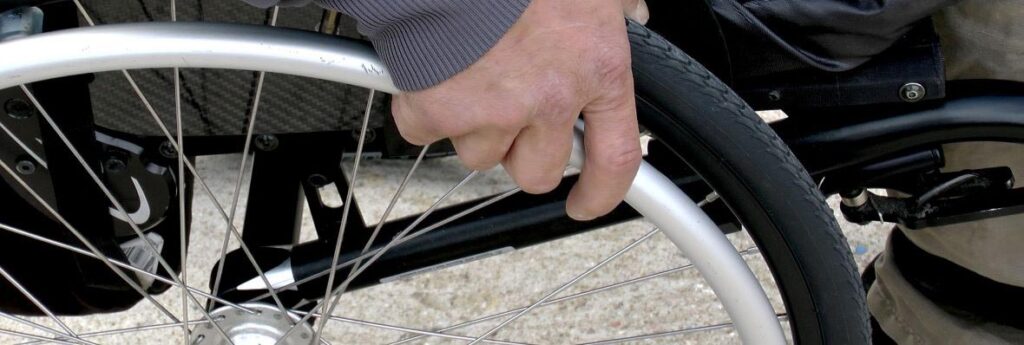IATA says its just-released 2023 Global Passenger Survey (GPS) related to accessibility of air transport to passengers with disabilities shows “significant satisfaction” levels among passengers who used special assistance services. But if the recent experience of a disabled British Columbia man who was forced to drag himself off an aircraft after arriving in Las Vegas is any indication, the airline industry still has a long way to go to ensuring helpful, compassionate service for all passengers.
Prince George resident Rodney Hodgins, who can’t walk due to spastic cerebral palsy and uses a motorized wheelchair for mobility, says he was shocked and angry when a flight attendant said he would have to get himself off the airplane because ground assistance personnel were not available to help him.
The 49-year-old hardware salesman says he was forced to use the strength of his upper body to pull himself down the airplane aisle, while his wife, Deanna, held his legs, which cannot move.
Hodgins says the experience has left him committed to making sure disabled people are treated with dignity and safety on flights.
He says he’s recently been contacted by Canada’s chief accessibility officer Stephanie Cadieux, who posted on social media earlier this month that a carrier had forgot her wheelchair on a cross-Canada flight.
The airline involved issued a statement saying it has reached out to Hodgins to offer apologies and compensation, adding that the company is evaluating how wheelchair users are assisted in Las Vegas.
IATA survey
For its part, IATA reported that 80% of travellers using special assistance services said that their expectations were met, according to the GPS survey.
The survey also aligned with airline experience that more travellers than ever are requesting assistance. With aging populations in many key air transport markets, this trend is likely to continue, and aviation, like many other industries, will struggle to find the resources needed to cater to this important demographic.
“In 2019, the IATA Annual General Meeting adopted a resolution reflecting our members’ commitment to ensure that every traveller has access to safe, reliable and dignified travel,” IATA Deputy Director General Conrad Clifford said. “While we all have more work to do to support the needs of our passengers with disabilities, we believe this survey result demonstrates progress towards that commitment.”
Linda Ristagno, IATA’s Assistant Director for External Affairs, observed, “As demand for special assistance grows, we will need to find more tailored ways to meet the needs of travellers with special needs. At present, a special assistance request is almost always met with wheelchair services. But the actual requirement of the traveller may be very different. The traveller may simply need help with wayfinding through crowded airports, or only have difficulty negotiating stairs, or may be totally mobile but visually impaired. We are working on ways to ensure that wheelchairs are available when needed as well as the right options for the diversity of traveller needs.”
The survey also highlighted website accessibility as an area for improvement. Twenty percent of travellers highlighted that improved website accessibility for booking and reservations should be a priority.
Recognizing this, IATA has recently issued guidance material on ensuring airline websites provide easy access to all necessary information for travellers with disabilities. With the aim to ensure equal access for all passengers, this includes:
• Developing a user-friendly gateway to the dedicated accessibility area of airlines’ websites,
• Clarifying the criteria for assistance entitlement, and
• Emphasizing the importance of passengers requesting assistance early, preferably during the booking process.
The guidance stresses a streamlined approach, enabling travellers with disabilities to access crucial information with just one click from the homepage. It provides best practices on creating clear and intuitive information pathways on airline websites for passengers with disabilities or reduced mobility, ensuring they have direct access to essential details about air travel arrangements and passenger rights.
In the meantime, the question on the ground remains: How does a situation like the one experienced by Rodney Hodgins happen? How can a flight attendant – or several flight attendants – or the front-end crew, or the agents at the boarding ramp in Las Vegas watch this happen? Were none of them able to help or to get help? Have we really become so desensitised, so hardened, so oblivious to the difficulties of people around us?
How shameful can we get?

